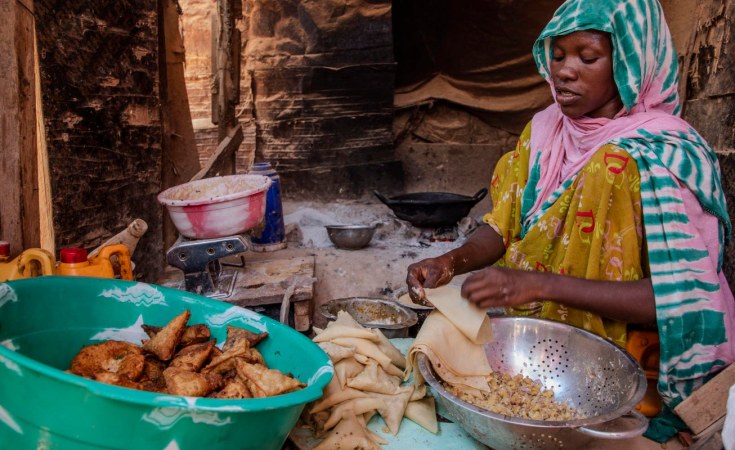As the holy month of Ramadan approached, Mandeq faced the daunting challenge of providing food for her family with very limited resources. Determined not to succumb to despair, she turned to a skill passed down through generations - making samosa, a beloved traditional delicacy savoured during Ramadan.
The camps in Garowe, in the state of Puntland in north-eastern Somalia, are home to thousands of families whose lives have been uprooted by conflict and climate-induced crises. The families in these camps grapple with uncertain futures.
Despite the hardships, however, there is a palpable spirit of resilience. To meet their basic needs, the families in Garowe utilise every available resource and opportunity to provide food for their loved ones, even in the most challenging circumstances.
Mandeq Adan, a mother of eight children, originally came from the rural areas of the Hiran region of central Somalia. She and her family are currently living in Shabelle camp in Garowe. She has lived here since 2022, when drought forced her to leave her home.
Mandeq launched her samosa business with a small sum she had saved up. She invested in acquiring all the essential ingredients, wasting no time in preparing them in her cosy kitchen once everything was in place.
"In each fold of the samosa, I wrap our hopes for a better tomorrow," says Mandeq. Her hands expertly fold and fry the samosa, her face illuminated by the dim light of her humble kitchen. Making samosa and turning it into an income-generating opportunity became her beacon of hope during the holy month.
Mandeq tells us that samosa-making is a cherished skill passed down to her from her mother.
"It is like a tradition that spans generations," she says. "As a child, I vividly recall watching my mother prepare samosa, and I was always eager to lend a hand by mixing the ingredients. The process was simple for me to pick up at that time. Samosa is a beloved snack and people can eat it anytime, but it holds a special place at Iftar [the fast-breaking evening meal eaten during Ramadan]."
Mandeq's samosa quickly gained popularity within the camp and the surrounding community. Customers visit her house every afternoon to buy samosa before the evening call to prayer signals Iftar time. Her business has not only provided her with a vital source of income for her family, but has also become a symbol of unity and generosity during the holy month.
"Food has the power to bring people together, especially snacks like samosa," says Mandeq.
The modest earnings from her samosa sales have allowed Mandeq to provide for her family. She has been able to buy food and other essential household items.
"Selling samosa has become a profitable business for me. It provides me with a regular income to support my children's nutritional needs and pay their school fees. I also use some of the money to purchase samosa ingredients. Additionally, I have set aside savings for new clothes for my children to celebrate Eid after the end of Ramadan," she says.
Mandeq is planning to continue her samosa business even after Ramadan. She sees this modest business as a sustainable source of income for her family, significantly contributing to their wellbeing.
Small businesses are not just a means of earning an income. They are lifelines that support families who have been forcibly displaced, and help them cope with and overcome the uncertainties of displacement. Small, independent businesses such as Mandeq's serve as engines of self-reliance, enabling families to become self-sufficient.
***
Investing in income-generating programmes for displaced women can foster their self-reliance and ensure they can meet their families' essential needs. In 2023, the Norwegian Refugee Council (NRC) was instrumental in enabling some 929,356 individuals in Somalia, more than half of whom were women, to establish and maintain sustainable livelihoods.
This initiative was more than a mere aid programme. It was a move towards lasting independence and stability for families who have faced displacement.


